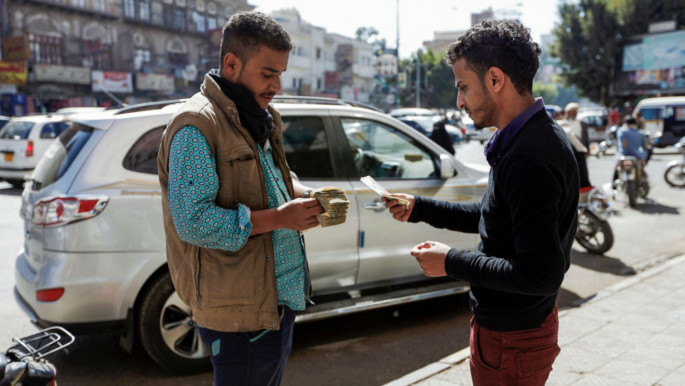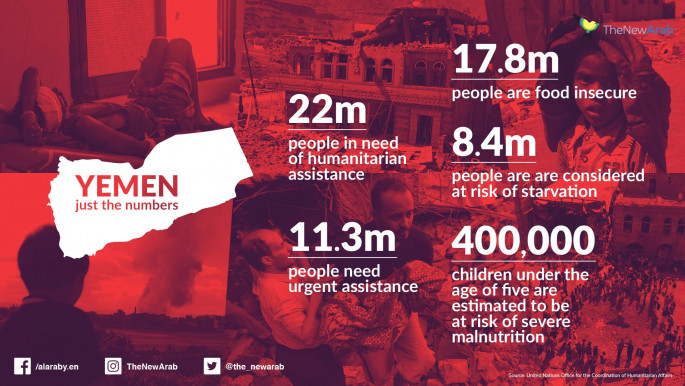What's in store for the Yemeni rial?
Officials of Yemen's internationally recognised government have revealed rigid procedures to help retrieve the value of the rial and maintain its stability.
Mohammed Zimam, the governor of the Central Bank of Yemen, said earlier this month that the bank will take legal procedures against companies and exchange centres that engage in "speculation" in the currency market.
Zimam stated that a number of exchange centres were temporarily shut down in Aden on the grounds of spreading "fake news" and speculation on the currency recovery, with the aim that they will then adhere to the exchange rate specified by the Central Bank.
Amid these economic challenges, the bank governor appears to be confident that the reserve, which is estimated at $2.7 billion, will shield the Yemeni currency from any abrupt slide.
 |
The Central Bank advised Yemeni citizens not to fall prey to rumours or rush to buy the hard currency, emphasising that the value of the national currency 'will see a remarkable improvement in the coming days' |  |
The Central Bank advised Yemeni citizens not to fall prey to rumours or rush to buy the hard currency, emphasising that the value of the national currency "will see a remarkable improvement in the coming days."
While government efforts are underway to speed up the rise of the currency, considering the formidable economic and political challenges, economists have shown cautious optimism towards this development.
Mustafa Nasr, head of the Studies and Economic Media Centre, said that the recent improvement of the Yemeni rial remains temporary unless sustained sources of the hard currency are maintained to fulfil the need of the country.
 |
|
| Read also: The quiet collapse of Yemen's economy |
Nasr attributed the recovery process of the Yemeni rial to some factors. One is that the Central Bank of Yemen continues to provide the hard currency for the importation of the basic commodities and fulfil the traders' need of the dollar. Moreover, printing further money has stopped and the currency speculation has been curbed, leading to a better value of the rial, according to Nasr.
Analogous to war, the falling rial has disturbed the lives of people nationwide. The price hikes have exacerbated the living conditions, pushing millions to the brink of famine. Though the markets appear peppered with commodities, multitudes of people have no income and many others cannot survive on their insufficient incomes.
A UN report has estimated that 20 million Yemenis are food insecure. According to a recent statement released jointly by FAO, UNICEF and WFP, "As many as 20 million Yemenis are food insecure in the world's worst humanitarian crisis."
Likely scenarios in store for the Yemeni rial
Hitherto, the latest procedures adopted by the Yemeni government, with support from Saudi Arabia, have been faring well to propel the rial value. However, these efforts may not rule out a likely collapse of the currency in a country that is awash with uncertainties and deep-rooted turbulence.
Three scenarios appear to be in store for the national currency of Yemen. One is that the rapid rise of the rial value will be short-lived and the recent economic procedures are no more than a fleeting cushion. The ongoing remedial steps may not be sufficient to maintain a lasting improvement of the currency, and this poses the possibility of the rial plunging once again.
The second scenario is that the wave of currency devaluation could erupt overnight given the volatile political and economic situation in the country. As politics can impact economy, Yemen has seen political chaos that results in economic turmoil.
 |
Though the markets appear peppered with commodities, multitudes of people have no income and many others cannot survive on their insufficient incomes |  |
To exemplify the connection between politics and economy, a few weeks after Prime Minister Maeen Abdulmalik assumed his post in October, the national currency began to improve largely. This proves the economic sensitivity to the political developments in Yemen. Therefore, any negative political issues can leave inescapable consequences on the economy, leading to the plight of the rial and price hikes.
The third scenario is optimistic. The national currency in Yemen may improve sustainably and this new prime minister will succeed to play a vital role in mobilising local, regional and international efforts to speed up and maintain the economic recovery in the country. The viability of this scenario hinges on the local and regional support for the government efforts in this regard.
Currently, the legitimate government is exercising its authority from Yemen's south, particularly Aden, the temporary capital of Yemen. This city has become the epicentre of the secessionist southerners who called for the removal of the former prime minister and continue to call for the Southern Independence.
For the new prime minister and his government to perform undisturbed in Aden, the cooperation of southern separatists is needed.
Moreover, the brutal role of the Saudi-led coalition in the war cannot be ignored or belittled in Yemen's politics and economy. Their "good intentions" will help to result in a good scenario, but their crooked agenda will give rise to disturbing scenarios.
The continuous fall of the currency adds to the suffering of people and creates a further army of food insecurity. Those responsible for the politics, the economy and the war in Yemen need to give the national currency due attention.
 |
|
The writer is a Yemeni journalist, reporting from Yemen, whose identity we are protecting for their security.
Join the conversation: @The_NewArab





 Follow the Middle East's top stories in English at The New Arab on Google News
Follow the Middle East's top stories in English at The New Arab on Google News


